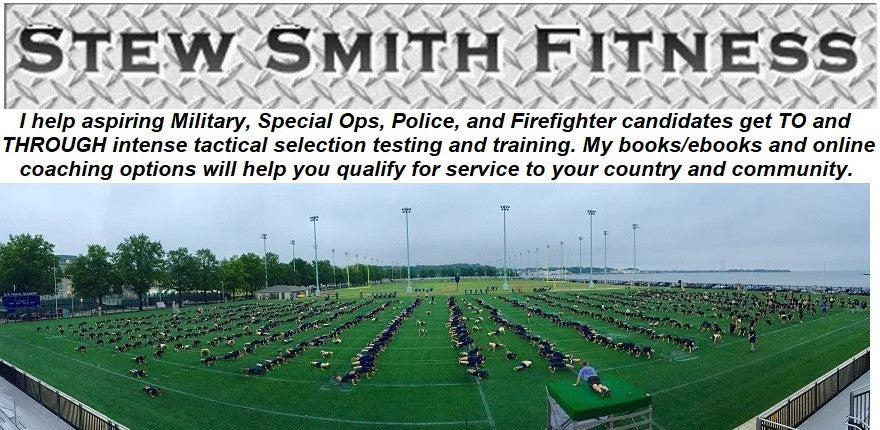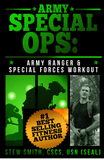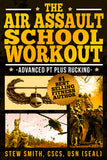Too Much Information Overload!
Determining Fact from Opinion
I was recently called an "influencer". I disagree with the new term being used with what many people do on social media. First of all, I have been working out and coaching and writing about it long before there was social media (even MySpace). Using the platforms to discuss training options is just another form of media just as my published books, downloadable ebooks, and website have been for decades. I am a coach that shares my experiences through multiple forms of media now. It is just an evolution of the times and how people communicate. Though the tag "influencer" gets used often, I am still a coach, who teaches tactical fitness by writing and speaking - nothing about that has changed.
We All Have Opinions (Some Are Based in Experience and Fact - Some Are Not)
You know what they say about opinions – we all have them. The goal of this article is to help you determine facts that you need to know from opinions that may not even apply to you. First, nobody’s opinion will apply to everyone. There is no one size fits all for preparing as every spec ops graduate comes from different backgrounds, education levels, work experience, athletic history, and training programs prior to attending selection. Sure, there are common traits to success and the opinion that you need all of them is simply not true.
When I was in my late teens / early 20s, there was no information on how to prepare for any spec ops training program. It was a big mystery, unless you knew someone that had been there done that. Even then, the advice you got was you need to run, swim / tread, ruck, and get good at calisthenics and don’t get crushed by equipment carry / log pt – and don’t quit! Now, there is so much information that most candidates are getting information overload and often “paralysis by analysis” determining the facts from myths and finding relevant opinions that apply to them.

Second, here are ten areas of interest you need to understand truth from fiction and facts from opinions:
1 – Know the Facts – Make sure you get official recruiting information from official military websites. This does not mean calling up a recruiter and asking questions YET. Show some initiative and do the research (on your own) and see the standards you need to meet not only to get accepted TO the training (phase 1), but to graduate or get THROUGH the training (phase 2). Many people will have opinions on the scores you need to talk to a recruiter / mentor, but the truth is if you are not able to swim, run, and do high rep PT, (AKA #crushthePST) you have no business joining the recruiting process. Yes, this is my opinion, but the Navy ships are filled with former spec ops candidates that did not listen to that opinion – FACT.
Do Your Research - I did some of the work for you here: Spec Ops One Stop Shop for Research Information.
Four Steps to Prepare for Spec Ops Programs
2 – Assess Yourself – You need to not only meet the standards on entrance fitness tests, but exceed them. NO MINIMUM STANDARDS. That is not just my opinion but that is facts! However, getting killer PT test scores will only get you TO the training. Depending on your athletic history, you may need more time during the preparation phase focused on getting THROUGH the training. The Assessment Tool to Get TO and THROUGH training is part fact and part my opinion. Being able to meet the PST / PAST test standards as well as some basic strength, greater endurance distances, and other elements of fitness will make you a better tactical athlete – period. However, my opinions of these assessment scores are based on decades of seeing what type of people graduate various spec ops programs. A typical recruiter’s opinion is first “sign here” and join, take the PT Test, and then we can discuss if you are ready or not.

3 – When to Join – Yes you can join the military at age 17 with parent signature. That is a FACT. However, just because you can, does not mean that you should – in my opinion especially if you are considering the special ops route and have no idea what you are doing. Graduating high school and looking at the next phase is life is not a good enough reason to join especially if you are under-prepared for a spec ops journey. If you are still growing, the journey into special ops is not a kid’s game and you will be there with fully grown adults who are not only physically mature but emotionally mature as well. Going into spec ops at this young age is statistically speaking A Perfect Storm for Failure for many reasons. FACT – Most people who quit or do not make it are teenagers. Some make it – TRUE. Most do not – also TRUE.
 My opinion is based on not only 18 year old me not being able to handle military spec ops training, but also seeing teens quit or fail every class since my first experience in 1991 -
My opinion is based on not only 18 year old me not being able to handle military spec ops training, but also seeing teens quit or fail every class since my first experience in 1991 -
my own BUDS class and everyone ever since.
4 – How to Join (Officer or Enlisted) – If you decide to join the military a few more years later, many people will get some work experience, go to college, play sports for a few more years, and finish growing. Whether you decide to join as an enlisted member, or an officer is more of a personal decision. Just because you have a college degree, does not mean to should or need to join as an officer. You should be able to and want to lead people as you progress in your career. Many enlist with the idea of staying “operational” longer and receiving more training (sniper, spec ops medic, JTAC, etc). That is a fact – enlisted personnel get those opportunities. However, many enlisted with college degrees become officers later in their career if they want to continue serving in that capacity. See articles and podcast discussion below and see many of the opinions and facts about the subject on whether to enlist or go officer.
Officer or Enlisted in Spec Ops
Tactical Fitness Report with Stew Smith / Jeff Nichols (Officer / Enlisted options)
How to Go Officer (Service Academy, ROTC, OCS)
5 – Running Man’s Game – How Much to Run? – You have heard people say that spec ops programs are a running man’s game. TRUE – you will run – A LOT! But it is so much more than just running obviously. If you are good at running – great. You may need to focus on other elements of fitness and not run 50-60 miles a week (some opinions). Other’s say no more than 20 FAST miles a week is plenty of running. Both are opinions and I have seen both fail and graduate over the years. Truth is – somewhere in the middle is a logical amount of running volume to build yourself up to WITHOUT PAIN / INJURY for a significant amount of progression / preparation time. The last thing you want to do is not run enough 4-5 miles distance runs at fast pace when keeping your miles low and you get overuse injuries. On the flip side, running too many long slow distance 10+ mile runs at a slower pace that does not meet the standards of training can cause even the 50 mile a week runner to NOT pass the timed runs. FACT - Being able to run 6-minute miles for PT test timed runs and easy 7-minute mile pace for longer 4-6 mile runs is the standard you need to meet to be a good – well prepared candidate.

Running to Get To and THROUGH Selection - The following is FREE eight week running plan that requires you to build up to 20 miles a week before starting this program, then focus on getting those 20 miles of running done fast using a variety of methods. (Goal Pacing, Hills, Sand, Sprint Intervals, Mobility / Non-impact Cardio, Run and Leg PT, and more). ***This is not a beginner running program.***
6 – Rucking / Swimming – If your spec ops selection has a major focus on one or the other or a combination of both, you need to be putting in the time getting good at handling the load of rucking and the challenge of swimming with fins in open water. There is a time investment required to ruck 6+ miles and swim 2+ miles with fins. You do not need to do it every day, but in my opinion, adding these to leg days each week is a solid option to your training. There is no doubt you need a well-prepared cardiovascular system as you will be running, rucking, and/or swimming depending on your selection program. Understanding the standards you need to meet is part of your research and your preparation will develop you to be a better candidate if you put in the time / effort in these time consuming cardio events.


7 – Athletic / Work History Prior to Joining – You do not need to be from any specific sport though we all have our opinions on what helped prepare us to be better team players, build toughness, and overall conditioning that made the spec ops journey possible. Truth is spec ops graduates come from all sports – even from no sports at all. There are kids who grew up skate rats, musicians, and worked odd jobs all their young life. Some learned what a hard day’s work was on a farm and other manual labor jobs as well. All of these are helpful to your successes in any spec ops journey. However, if you come from none of these backgrounds, the preparation journey may be longer for you but it is still possible if you are honest with yourself and fix all of your weaknesses you have and meet the assessment standards. Regardless of your history, you will start the preparation phase of the spec ops journey with some strengths and weaknesses.


8 – Just Don’t Quit – Many will hear the advice of get to your selection and “just not quit”. While this is true, you cannot quit if you want to do any spec ops profession, however, you can still get kicked out no matter how mentally tough you are. In selections, most people quit due to the extreme hard work and discomfort that is accumulated on a daily basis. From too hot, too cold, too wet, too tired, too sore, too dirty, to getting negative feedback on a constant basis from instructors many self-select to not continue. However, there are standards and if you are not fast enough with running, rucking, swimming, obstacle courses and other events, you will fail out of training. Failure to perform at the selection standard as well as injury (traumatic, accident, or overuse) are two of the biggest ways to not finish selection so you cannot go to training with the “just don’t quit” mindset. You must go with the “crush everything” mindset. Train to compete and be in the top 20% of the class because if 80% do not make it, you want to be in that 20%. FACT.
Quitting or Not Quitting – The Choice is Yours
My opinion: "You Never Think About Quitting, When You Think About Winning" ~ Stew Smith
9 – Mental Toughness – Everybody has an opinion on mental toughness. You can find books, articles, videos on the topic or you can "just get tougher” (Jocko Willink). To be honest, in my opinion, it comes down to HOW BAD DO YOU WANT to do this job and are you tough enough to endure the test that is selection. Also, do you have a good answer to tell yourself when you are cold, wet from sitting in dark ocean water, sandy, tired, and there is no end in sight? What do you say when your WILL is challenged? See One Stop Shop for Mental Toughness Training Skills
10 – A Way to Train – Not THE Way to Train – There are many ways to prepare yourself for any of the spec ops selections and being an active-duty operator. You may have heard my discussion that “I have A way to train not THE way to train” – that is a FACT. When you hear someone say “this is the best or the only way” – that is an OPINION and simply not true. THE way is the way that worked for YOU and it may not be the same that works for someone else with a different background of strengths and weaknesses. Finding THE way is a journey itself and it is discovered by testing, positive results, progress, and growth into meeting and exceeding the standards of the profession you seek.
11 - Extra Credit - You Need PEDs to Get Through BUDS! FALSE. If you have heard this, you likely heard it from either a quitter or a cheater. You may see them but you will be tested and will be dropped from the course. Don't take the opinion from weak people who need to cheat. That is not who you need to take advice from in your life.
A spec ops candidate today, has to get out of his own head and stop over-thinking all the pieces of advice they are receiving from ten different spec ops veterans. Pick one and go with it - try it on, see if it works, move on to the next method or focus on a different weakness. This journey to fully prepare takes time - be patient and you will see results - FACT!
More About Spec Ops Prep
If you really want to know how to take this to the next level, be one of the thousands successes to check out these Special Ops Programs available at StewSmithFitness.com. This makes it easy for you to become mentally and physically prepared to graduate spec ops training without having to even thinking about quitting.
Who Is The Coach, Trainer, Author Stew Smith?
 |
I'm the former Navy SEAL that special ops candidates go to for books, ebooks and online coaching to prepare themselves to get to and through intense tactical assessment and selection programs and qualify for service in their chosen tactical profession. See More at StewSmithFitness.com |
What Programs Are Right For YOU?
It depends on your scores compared to other successful students. See the Assessment Tool to Make it To and Through Selection and se where you stack up with all the elements of fitness - not just a PST score. 




It depends: The Complete Guide to Navy SEAL Fitness is a classic and focuses on high rep calisthenics and running and swimming base. You will build up your running over 12-18 weeks to 20 miles but very fast paced focus on both the 1.5 mile run for the PST and the 4 mile timed run for weekly run test at BUDS. If you are an athlete with a strong power / strength background in lifting and not running or swimming, Navy SEAL Fitness is ideal for you. IF you need some place to start Navy SEAL Fitness is ideal for you as well because a calisthenics base / running / swimming progression is a good place to build a foundation. Though you will likely need to spend some time in the Navy SEAL Weight Training Book OR if Navy SEAL FItness is too challenging, go with Navy SEAL SWCC, EOD, Diver, PST Phase 1 Workout. Phase 1 is a good starting point if Navy SEAL Fitness program is too tough.
Navy SEAL / SWCC, EOD, Diver Program Series - Phase 1 is what I call a beginner guide, but it is still challenging. It is geared toward those who are scoring minimally or failing their Navy PST test - 500yd swim, pushups, situps, pullups, 1.5 mile run. It is easier than The Complete Guide to Navy SEAL Fitness and a good prep course before attempting it.
Phase 2 and 3 of the Navy SEAL / SWCC, EOD, Diver program is about the same level of intensity as Navy SEAL Fitness and is also a good follow-up plan after Phase 1.
Phase 4 ot the Navy SEAL Key to Mental Toughness is by far my toughest workout ever created. It resembles a day of BUDS, complete with "wet and sandy", runs after eating, high rep punishment push-ups, 4 mile timed runs, 2 mile swims with fins, log PT simulation, and even a HellWeek Simulator with 3 workouts a day.
Tactical Fitness Series - Tactical Fitness, Tactical Strength, and Tactical Mobility is an ALL-encompassing program that focuses on lifting, calisthenics, run, ruck, swim, speed, agility, and flexibility / mobility. Many people focusing on USMC (OCS, RECON, MarSOC) Army Ranger / SF, Air Force Special Warfare, SWAT / Federal Law Enforcement, and Navy Special Warfare have done very well focusing on the Tactical Fitness Series and developing themselves into an all-round Tactical Athlete.

More Options:
Special Ops – Most of my programs tend to focus on getting TO and THROUGH a specific tactical training program. So you may see a mix of all the seasons in some of these books, but if you are training long term, you can take advantage of Seasonal Periodization and save yourself some of the over-use, long term pains that tend to follow many of the tactical preparations - especially on the spec ops level of training.
Start training today with workouts that focus on the specifics of getting to and through tactical profession training from firefighter, police, swat, military to special ops. We have programs to help you get TO and THROUGH training.











